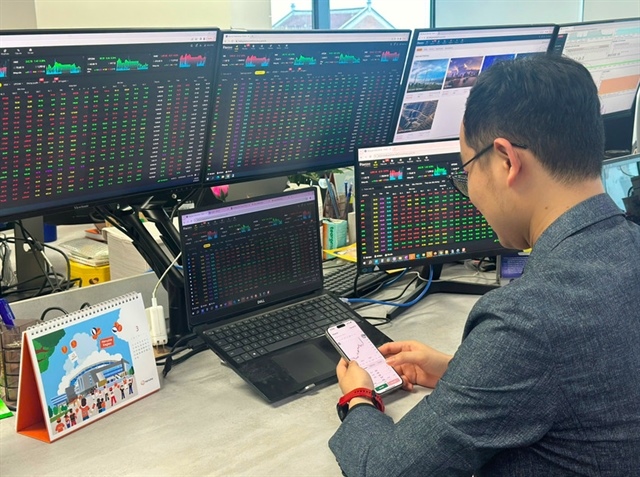Margin loans decline on tighter credit policy
Margin loans decline on tighter credit policy
Credit segments utilised at securities companies for margin lending will be more tightly controlled next year, while total margin loans at securities companies currently stand at a relatively low level.

Credit is currently poured into the securities sector mainly through two channels – the loans that securities companies take from banks for margin lending and loans that single investors borrow directly from banks.
Margin trading refers to the practice of investors borrowing money from brokerage companies to purchase securities worth more than the investors’ net asset value in their accounts.
It is considered a financial leverage tool as it allows investors to buy more stock than they would be able to normally. But investors wishing to use margin trading have to deposit at brokers to form the collateral for their loans.
According to statistics from the State Securities Commission (SSC), credit poured into the securities sector remains at a very low level. Credit that banks use to finance securities companies for margin lending is currently estimated at about VND21 trillion to VND22 trillion. Meanwhile, the amount borrowed by individual investors to trade stocks is estimated at about VND1 trillion.
“Both numbers are too small because the total credit poured into the two channels accounts for only about 0.3 per cent of total outstanding loans of the commercial banking system,” an SSC official whose name was not disclosed told online newspaper vneconomy.vn.
During the ongoing sixth session of the 14th National Assembly held in Ha Noi on October 29, Governor of the State Bank of Viet Nam (SBV) Le Minh Hung shed light on the management over stock market operations.
He said ministries and agencies have to work together to control credit quality, especially credit in the securities market. Whenever any contingencies arose, they need to promptly disseminate information, thus strengthening trust among investors.
At the opening of the 6th session of the 14th National Assembly on October 22, Prime Minister Nguyen Xuan Phuc presented a report on the socio-economic development plan for 2019, which announced that the credit growth target set is around 17 per cent.
PM said lending next year must focus on the Government’s prioritised sectors while taking tight control over capital poured into risky industries such as real estate, securities and consumer lending.
Speaking to vneconomy.vn, the SSC official said that the “tight control” message raised by the PM did not mean limiting credit spent in two sectors of securities and real estate.
“Tight control here should be understood as the enhancement of inspection and supervision over the lending procedures in these two areas as the Government has always identified real estate and securities as two important sectors of the economy. The stock market is also an important channel of the economy’s capital mobilisation,” the leader said.
Margin loans at securities have also declined since the third quarter of this year.
According to Ho Chi Minh City Securities Corporation (HCM), margin loans at the company are estimated at VND3 trillion ($128.3 million), lower than its previous peak of VND5 trillion.
The figure for Saigon Securities Incorporation (SSI) is VND4.8 trillion, down from its peak of VND6 trillion recorded in April. Many other brokerages are also facing the same situation, such as Viet Capital Securities Joint Stock Company (VCI), VNDirect Securities Corporation (VND), MB Securities Joint Stock Company (MBS) and Bao Viet Securities Company (BVSC).
Competitive interest rates
In the context that the stock market is falling into bearish status and investors remain cautious about market prospects, many securities companies are diversifying their margin-related services to provide a wider choice for investors.
Interest rates on margin trading offered by securities companies now remain at a very competitive level, hovering around 12-14 per cent per year, depending on the value and the period of the loan.
VNDirect is applying interest rates on margin lending at 13.5 per cent per year. The figure for Yuanta Securities Vietnam is 10 per cent to 11 per cent per year, and that for Maybank Kim Eng Securities Limited is around 10 per cent per year.
Compared to domestic securities, foreign securities companies can offer more attractive interest rates on margin lending as they have more support from their parent company who have strong financial capacity. Their lending interest rates often range from only 3.5 to 4.5 per cent per year, to a maximum 5 per cent per year.
Increasing foreign net buying
According to updated data from the SSC, as of October 16, the total net foreign inflows poured into Viet Nam were estimated at US$2.97 billion, surpassing last year’s total figure of $2.92 billion.
This figure is a good sign compared to the current situation of capital withdrawal from emerging markets. From the beginning of the year, foreign investors have withdrawn from seven Asian markets including South Korea, Thailand, Indonesia, the Philippines, India, Taiwan and Malaysia with a total value of $27.34 billion.
As of October 16, the value of foreign investment portfolios was estimated at $36.3 billion, up $3.5 billion against the 2017 number of $32.8 billion.
Particularly, the cash balances on foreign investors’ accounts was still high at around $1 billion, ready to be disbursed.



























